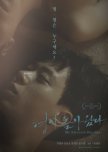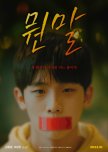
An exploration of the growing drag culture within Taiwan's queer landscape
The 2021 short film 'Best Sisters Forever' revolves around the elegant Xue Rong / "Snow" (Heng-Chi Kuo) and the fun and frivolous A Du / "Cavon" (Soda Voyu), two gay "sisters" best friends, who after having a heated discussion about issues of promiscuity, end up distancing themselves from each other.A tragic event allows the reunion of the two "sisters" a decade later. Knowing that their days together are numbered, the couple embarks on an adventure in hopes of recapturing lost opportunities and creating happy memories. Along the way, they make important discoveries about life, love, friendship, and family. Promises are kept and a long lost dream comes true.
The year after releasing 'Your Name Engraved Herein', a film shortlisted for four awards at the 57th Golden Horse Awards 2020, Liu Kuang Hui (Patrick Liu) offers in 'Best Sisters Forever' an authentic vision of the drag sisterhood in that Asian island.
Associated with GagaOOLala, the Taiwanese director explores the growing drag culture within Taiwan's queer landscape, and reflects on questions of identity, empowerment, bonds and brotherhood within the flamboyant Taiwanese community.
To this end, the film features original performances by some of Taiwan's most famous drag queens at Taipei's most iconic LGBT venue, the historic Red House in Ximending District.
"What has always fascinated me is this special sense of bond or brotherhood that exists between members of the gay community but is rarely talked about or discussed in the mainstream. "So, this is where I wanted to play with this idea of 'sisterhood' and create a story around it specifically in the context of drag," Liu says when premiering the work.
With the intention of visualizing 'drag' and brotherhood within the community, Liu calls on two of the most important actors in the Taiwanese entertainment industry: Heng-Chi Kuo and Soda Voyu.
The first is a singer, director and composer who makes his official screen debut as an actor in this film. In addition to acting, Heng-Chi Kuo performs the main theme of the film: "Don't Rub Salt on the Wound", a song composed in 1999 for A-Mei, the singer considered a gay icon and defender of Taiwanese indigenous and LGBT+ rights throughout the Mandarin-speaking world.
For his part, Soda Voyu is an outstanding actor, winner of the Golden Bell Award, with an extensive filmography, which includes the film 'Tale of the Lost Boys', from 2017, the drama 'Magic Showdown', from that same year, 'iHero 2' and 'Your Name Engraved Herein'.
Thanks to 'Best Friends Forever', both actors play drag characters in a film for the first time, an experience that both together describe as "very entertaining but challenging, a special project that was worth pursuing, especially for its deep cause and the "so necessary drag defense."
Best Sisters Forever is the third installment of GagaOOLala's 2021 anthology 'Queer Up The Volume', a collection of original queer stories, each with their own title track and music video, aiming to portray the different facets of the community. contemporary queer.
The Queer Up The Volume project also includes other titles, such as the second season of GagaOOLala's successful Thai-Taiwanese BL co-production series, 'Call It What You Want 2', by Anusorn Soisa-ngim (Aam); 'Light', from director Adiamond Lee and starring Jed Chung, Max Liu and Ding Ning; the Taiwanese BL drama 'Dark Blue and Moonlight', and 'Fragrance of the First Flower', the lesbian miniseries by director Angel Teng (Bao Bao), winner of the first prize of the GagaOOLala Pitching Sessions 2020.
Was this review helpful to you?

The transformative power of cinema to improve society
Taiwanese screenwriter, director and producer Angel I-Han Teng believes in the transformative power of cinema to improve society. In this way, he writes the script for 'Bao Bao' (親愛的卵男日記), an LGBT+ themed drama co-produced between Taiwan and the United Kingdom, which focuses on the struggles of same-sex couples to form families in that Asian island.Presented at Outfest, the Asia-Pacific Film Festival, in Los Angeles, United States, in 2018, and released in theaters in Taiwan and Japan that same year, the film, directed by Shie Guang Cheng, revolves around two homosexual couples: Joanne and Cindy, and Charles and Tim. The four young people live in London and plan to have children, but then they have to return to Taiwan, where challenges await them.
'Bao Bao' was written and made while Teng was residing in the United States, but it tells an exclusively Taiwanese story, but universal due to the impossibility of homosexual couples to adopt children and marry in countries where people of the same sex do not have the possibility of getting married.
For the filmmaker, the best result is to be able to make Taiwanese stories with Taiwanese actors and then let an international audience see and appreciate them.
Her training in Psychology allows the writer to develop complex characters in her work faced with complex dilemmas, such as homosexuality and the adoption of newborn children.
In her marriage to Joanne/Xu Jie An (Christine Ke), Cindy/Fang Rong Xin (Ries Emmie), is a young woman who is expecting two babies, but loses one. Having also lost trust in her partner, Cindy doesn't know where to go, who to believe, or whether it's her baby or not. So, he decides to return to Taiwan from London, where he has lived for some time. In her hometown, she will find care in Yang Tai / Ah Tai, (Yankee Yang), her childhood best friend, who promises to raise the baby with her.
Confused about what a family should be like, Cindy finally works up the courage to confront Joanne and the gay couple of Charles Watanabe/Du Bian Zhi Jiu (Yukihiko Kageyama) and Tim/Li Hao Ting (Daniel Tsai). At the time the film was filmed, equal marriage or homosexual marriage was not yet legalized in Taiwan. Even today, after this right has been legal since 2019, the existence of same-sex parents is still not acceptable for that society. And our protagonist trusts that that day will come.
With this, her first narrative feature film as a writer, the also sound specialist and with extensive experience working as a recording engineer and sound mixer, begins a filmography in which she addresses issues related to identity, gender, feminism and rights. humans with a subtle sensitivity, as can be seen in 'Rose Skirt' (玫瑰色的裙), 'The Fragrance of the First Flower', winner of the Gold Award for an investment fund at the GagaOOLala Pitching Sessions, or 'A Balloon's Landing'(我在這裡等你), 2024.
'Bao Bao', a film that allowed Angel I-Han Teng to obtain the Excellent Screenplay Award from the Taiwanese government, is also an example of his interest in the musicality of cinematographic components that go beyond the conventional limits between sound and music in cinema.
Teng's fascination with highlighting gender issues begins in his Family Psychology classes at the University: "Not only was I not familiar with same-sex parent households, but I noticed that all the examples the professor gave were from abroad. Those from Taiwan either didn't stand out or weren't seen. A creative light bulb went off in my head," he says. He adds: "I appreciate the beauty of individual differences although we share many similarities. The complexities of the human mind open my imagination to create works of art. I wrote many scripts and entered competitions, some of which completely changed the course of my career my life…".
Was this review helpful to you?

Excellent family psychological drama
Twenty-one minutes are enough for South Korean screenwriter and film director Jang Young Seon to present and develop the conflicts of this family psychological drama that revolves around a dysfunctional family that has been trying for more than a decade to compensate for the loss of a child by adopting young people to replace it.With an intriguing plot, well-developed characters, music consistent with the conflicts raised, and a dark color palette, the short film 'My Eleventh Brother' (형이 돌아왔다), from 2016, begins when the family of high school student An Sung Woo (Kim Myung Kyu) arrives with the newly adopted An Sung Kyu (Lim Ji Hoon), a young man who also comes from a broken world, having spent his life in foster homes.
While Sung Kyu, who recognizes himself as a "nobody", searches for the family he longs for, Sung Woo searches for his place in the world. Both young people have a secret that they have preferred to hide from others: they are homosexuals.
The first thing that catches my attention is that the title of the short film refers not to the eleventh child of the family, but to the eleventh brother of the main protagonist. This tells us that what is intended to be highlighted is more than the relationship of the adopted young person with the family, it is the relationship of the newcomer with the son of the family, that is, with his brother.
The film tells how Sung Woo rejects Sung Kyu, as he surely could have despised others before him, until he discovers, in the midst of a premature antagonism, that between the two there are more reasons that unite them than those that can separate them.
This is how they eventually end up finding refuge in each other. But not only that, Sung Kyu will also manage to bring peace to the family, especially to the mother (Jung Soo Young). The scene of the mother and adopted son sharing games and laughter, which shows a change in the woman's depressive and sad personality, also demonstrates that Sung Kuy is the ideal missing member of the home.
Premiered at the Seoul Pride Film Festival 2016, 'My Eleventh Brother' is a short film with moving scenes, clear development and growth of the characters, which addresses themes such as coming of age, the search for love and happiness, psychological traumas and family relationships.
Despite its disturbing, at times suffocating atmosphere, 'My Eleventh Brother' leaves me with that momentum that makes you want more and more of the show. It's not boring at all, and every scene is suspenseful and will keep you on edge worrying about what will happen next to keep you completely pleased.
Was this review helpful to you?

This review may contain spoilers
How much and in what way will our own decisions and those of others affect us?
One of the most complex and uncomfortable topics in human relationships is infidelity, but our worst qualities, decisions and actions are a great tool for cinema, which can turn even the most twisted relationship into an emotional, deep, complex story. and explosive, which divides opinions and leads us to explore what we do not dare to see in ourselves.Infidelity is ugly and painful, and can be traumatic for many people, but it becomes interesting and arouses curiosity when it is a "tragedy of others", the kind that movies show us, and it is also a good way to learn about more about the subject, the reasons that lead us to betray our partner and the way we deal with all that.
'Spring Like a Lover', by director, screenwriter and editor Daisuke Shigaya, is a 2017 Japanese film that proposes an unusual love triangle between three homosexual men whose lives fatefully intertwine.
Kazu (Konosuke Furuya) distrusts her current boyfriend, Shin (Tact Igarashi), a moody photographer, because she believes he is unfaithful. After an argument, Kazu revisits her ex-boyfriend, Takashi (Kazuki Kawakami), but discovers that he is now married to a woman and is unaware that this man is the one Shin has been having sex with behind his back. After the reunion, Takashi rekindles his feelings for the person who once shared his bed.
In this story about sex, betrayal, obsession and toxic relationships, the lives of these three men become complicated after the infidelity of one of them towards his partner. Of course, no one deliberately wants to harm others, but that is exactly what they end up doing.
One night, Takashi tries to have sex with Kazu, but Kazu immediately rejects him, not wanting to be involved in a relationship with a married man, and returns to Shin's house.
In Kazu's absence, Shin goes out to the terrace where her boyfriend has a beautiful caged songbird and deliberately tries to make the bird fly out of the cage. When he doesn't succeed, he leaves the door open.
In this short film that explores the universality of human emotions and poses a question: How much and in what way will our own decisions and those of others affect us? When reality breaks through, this complicated love triangle leads to tears, confrontations , breakups and violence.
After returning home, Kazu and Shin's reunion allows them to reconcile and strengthen their relationship. However, Takashi has not been able to forget Kazu, so he confesses to his wife about his sexuality, and she breaks up with him, but not before accusing him of betrayal for not having been honest with her.
Kazu is the most empathetic character of the three. Because he cares about Shin, he is able to activate a protective instinct in him. She loves her boyfriend, so she will seek to prevent him from suffering the consequences of her own actions and decisions, even if the price is high. He has seen how the photographer is heading towards a precipice and since there is nothing he can do to stop him, he appears frustrated and helpless. The image in the bathtub is, in addition to being heartbreaking, symbolic in this sense.
Shin is not a good man who messes up and makes a mistake. Both the script and the film are responsible for emphasizing that she is deliberately unfaithful to her boyfriend, and this fact will unleash all the subsequent conflicts. In addition, he violates people's privacy by taking photos of them in the streets without their consent, so he has to flee when he is caught in the act, because although in Japan it is not a criminal offense to photograph people's faces in public, it can be a crime. a civil offense if the person who has been photographed finds or fears that their image may be published anywhere.
On the other hand, Shin shows a cruel and violent face, not only for hitting Takashi, but for retaliating against Kazu in the bird for abandoning him and leaving the house. Even so, the strong emotional control she has over her boyfriend is evident.
Between arguments, crying, beatings, nude scenes and explicit sex, the 33-minute duration of the footage passes, which should not be analyzed, evaluated, labeled and classified as BL. There is a tendency among lovers of the so-called "Boys Love" to classify as such any love relationship between boys on the screen, and when they discover that the audiovisual shows a more complex dynamic, with characters with diverse nuances, circumstances and conflicts that surpass those of the genre of their preference, they accuse that this is not what they want to see, that they do not understand the film or television proposal, and they advise others not to see the artistic product, but not before giving low ratings on platforms where they are discussed. and analyze these dramatizations.
'Spring Like a Lover' is not a BL genre film, but an LGBT+ themed drama. The viewer should not expect to find here a tender and light romance between boys of those in which the audience is more interested in knowing the height of the step from which one of the protagonists will fall into the arms of the other to be happily ever after, in instead of living an experience closer to real life.
That is why 'Sprint Like a Lover' does not shy away from presenting damaged, broken, unfaithful, lying and miserable beings, as well as betrayal, infidelity, dysfunctional relationships, violence in the couple, breakups, pain. It does not shy away from showing romantic lives that are flawed and in complete anarchy.
If Shin's infidelity has an impact on the couple and on Takashi, the latter is the living reflection of human misery, selfishness, hypocrisy and limitless cruelty in demanding sex from Kazu in exchange for Shin's freedom, in addition to accept money from Kazu to drop the charges against her boyfriend.
The three men carry the entire weight of the film, without ignoring the brief presence of Takashi's wife, and are capable of transmitting emotions with gestures, silences, screams and looks in a performance as subtle as it is extraordinary, closing an intense, heartbreaking film. and very emotional.
The ending does not surprise fans of dramas that explore relationships with all their contradictions, conflicts and realities. Shin's infidelity causes his own ruin and that of the other two men.
"No one is an island, complete in himself," the poet John Donne wrote centuries ago. That is why Shin's actions influence both his own life and that of the other two characters, and end up affecting them directly. By being forced to assume the consequences of their own decisions and those of others, they see their worlds destabilized and condemned to a spiral of many other equally erroneous and destabilizing acts and decisions.
It is then that the viewer can understand the message of the film: the importance of becoming aware that every decision we make and every act we perform has natural and social consequences. We are all responsible for every decision we make and every act we perform, in such a way that we can say that our life is the result of our choices and not of circumstances. While it is true that circumstances influence our reality in life, it is also important to accept the fact that what is truly determining is the way in which we choose to react to each situation that is presented to us.
Perhaps somewhat underrated at the time, with the passage of time it has gained public understanding, but it must be seen because Daisuke Shigaya knew what he was doing with this film of rebellious and explosive emotions. We are rational beings, which adds one more element to the mere instinctive aspect that characterizes us. The fact of being rational beings implies that we can choose the way we react to the different circumstances in life, hence the statement that our life is the result of our decisions, not the circumstances.
Observation: MDL and other platforms make a mistake by labeling Tact Igarashi as Kazu. The character of Kazu is played by Konosuke Furuya, while Tact Igarashi plays Shinji Matsumoto or simply Shin, Kazu's photographer boyfriend. The character of Takashi is played by actor Kazuki Kawakami.
The director, screenwriter and editor of the film is Daisuke Shigaya.
Please, if someone could help verify and correct the error I would appreciate it. Thank you.
Was this review helpful to you?

A one-sided love of a boy for a boy
Dong Young (Kim Dong Young) has been secretly in love with Jung Min (Lee Jung Min), his best friend, since he met him 10 years ago, and he has come up with an idea to finally declare his love.Romantic dramas, no matter how short in duration, achieve immortality when in a single scene they manage to convey the spirit of the central bond.
'What To Say' (뭔말 Mwonmal), by South Korean filmmaker Kang I Deun, has a sequence of overwhelming subtlety, in which we witness how a young man assures his best friend that he will make a film, and to the astonishment of This will reveal the scenario written in the script to be captured in moving images, which is none other than the same story of the friendly relationship that has existed between the two friends and how the main protagonist of the film to be produced would like to carry that bond on another level, even knowing that it is "a cliché story where Woo Joo's first love (the name he gives himself in the future film) ends unsuccessfully."
With a precise, contained and melancholic narrative, Dong Young will know the answer, which will leave him devastated by heartbreak.
I am not issuing a spoiler: the same trailer for the short film on the AYDENSTORY channel assumes that we are in the presence of a unilateral love of a boy for a boy, and how this secret love follows them until one declares, with subtlety, naivety and creativity, their feelings for the other.
That statement highlights the purest love that Dong Young feels for this man who will never want (or be able) to live up to such a naive and immaculate confession.
The main reason why I recommend the film and give it a perfect score is that the director conceived flesh and blood, complex and human characters, who go beyond stereotypes. In this way, the young man who resorts to fantastic narrative to declare his feelings is not superficial by any means: he is simply a man who fell in love with another man. Following this line, the character played by Kim Dong Young is endearing because he has finally had the courage to take that step that has cost him a large part of his existence, although this presupposes the risk of not only losing the love of his life but also to the childhood friend.
The director himself has stated that the objective of the film is to expose "the long hesitations and great worries, brief confessions and small consolations. I hope that all the universes of this world are happy."
Was this review helpful to you?

This review may contain spoilers
A small student work with immense power
The first thing that catches the viewer's attention is seeing a boy in a school uniform shaving his head with a cut that is too deep, almost releasing blood, while crying inconsolably. This is what Juan Pablo Pineda III, the director and screenwriter of the LGBT+-themed romantic short film 'Coming Out' (Pua Iyam, for its title in Tagalog), wanted to convey, since it is the true essence of the film.Ken, a Chinese-Filipino teenager, has known his true identity for a long time, but has not dared to reveal it out of fear. However, reading a book titled "Pua Iyam" gives him the courage to confess his love to Miko, his best friend since childhood.
Going back to my opening words and the first scene of the film, Ken cries and shaves his head because he has been rejected. And Miko, although she also loves Ken, knows that her family and society will not understand them and "I am not prepared to admit what I am", referring, of course, to his homosexual condition.
If I say this it is not to issue spoilers, but to express in words what the short film subtly lets us see: the fear that the two boys suffer of discrimination and rejection by society due to their sexual orientation, which is why They feel insecure about their identity and avoid revealing it to others and to themselves. They prefer to suffer and make the person they love suffer before recognizing and loving themselves.
The objective of the short is to make a complaint against homophobia, that is, the aversion towards homosexuality or against homosexual people, and its eternal companion, internalized homophobia.
In the final scene, while Ken and Miko are playing after reconciling as friends, they both stare at the camera. Could this be a sign of hope? Will Philippine society ever come to respect all its members equally, regardless of their gender identity or sexual orientation?
Starring Rowi Du as Ken (who also produces, edits and sounds) and Raphael Cruz as Miko, the film had its world premiere at the Far Eastern University (FEU) SinePiyu Film Festival - Manila, in which it won the Awards for Best Film, Best Performance for Du, Best Direction and Best Poster in the Black Reel category.
The film follows his journey through different Philippine film events, such as the 7th. CineSB: Indie Un-Film Festival of the University De LaSalle College of Saint Benilde, in Manila, and the University of the Philippines-Diliman, and wins in the categories Best Direction for Pineda and the Gold Award for Best Film for the team of production by IndieGo Pictures, and the Awards for Best Production Design and Technical Excellence in the Sibol Category of CineSB 7: The Main Installation of DLS-CSB.
The film takes home the award for Best Cinematography and another special mention from UP Cinema's Piling Obrang Vidyo jury's decision, and obtained the Cardenal Bronze Film Award, Best Editing and Best Photography in the intercollegiate category of CineMapúa 2018.
The film is also selected as part of the 2017 CineMakulay Film Festival, the 29th Gawad CCP for Alternative Film and Video of the Cultural Center of the Philippines. It is also exhibited as part of Eksena 2017 organized by Dalubhasaan ng mga Umuusbong na Mag-aaral ng Araling Pilipino (DANUM) DLSU.
After winning the awards for Best Screenplay and Best Actor in a Leading Role at the 9th Largabista Film Festival in Tacloban City, Leyte, and a special mention for gender sensitivity at the First Palawan International Film Festival, the short film 'Pua Iyam' continues its journey beyond the Philippine borders and reaches the United States and China.
On North American soil, 'Pua Iyam' is screening as part of the "Queer Stories" section of Diwa Filipino Film Showcase, the film festival held in cooperation with the annual Pagdiriwang Filipino Festival, celebrating the Filipino spirit wherever it resides by sharing Filipino and Filipino-American stories with the community of Seattle, United States.
And then it competes for international recognition at the PRIDE Film Festival in Shanghai, China, and the Beijing Queer Filmfest, in the capital of the Asian giant.
If I list so many awards and achievements it is not to waste words, but to highlight how this small work, carried out by a Communication student from the Far Eastern University (FEU), in Manila, has immense power to make audiences reflect on the need to advance against heteropatriarchal discourse.
Was this review helpful to you?

Motorcycle, love triangle, sexual awakening, indie cinema and for LGBT+ visibility
Who doesn't like movies that portray young loves? It is a cinematographic subgenre that has a special charm, because it is very easy to identify with the characters who experience those first tickles in the stomach and an unknown sexual attraction towards another person.Who doesn't like movies that have the motorcycle as another protagonist, being one of those in which the good guy is better, the bad guy worse, to save the world, to chase evildoers, to escape from the abyss, and also, of course to fall in love?
Who doesn't like movies in which a guy lets the co-pilot hug his body to avoid falling off the motorcycle?
Who doesn't like movies in which the boy claims he's never hugged anyone before, and the other admits that it's also the first time he's allowed himself to be hugged by another person?
Who doesn't like movies in which from the action on the road to the connection between two people, embraced side by side, they transport us to worlds full of adrenaline, adventure and a deep love on two wheels?
But what will happen if we add a third love interest to all this? What will happen if instead of two guys on a motorcycle, there are three people on two wheels who end up involved in a love triangle?
Starring Fongfong Pathomporn Panfa ('My Star' and 'My Star: Uncut Version', both 2024), as Gentle, and Jo Ronaporn Vipataputi ('My Streamer', 2023 and 'Boy Scouts', 2022, 'My Star' and My Star: Uncut Version', 2024), like Motor, the film 'My Biker' talks about the discovery of sexuality in adolescence, sexual awakening and, more specifically, what it means to accept one's own homosexuality. It is, in essence, a story that supports diversity and also LGBTIQ visibility. Gentle discovers his sexual orientation in a heteronormative world by spending time with his best friend, with whom he establishes an emotional and sexual connection.
'เราและนาย My Biker' is an original short film by Wayufilm Production, in association with Pigeon Pictures, following 'The Internship', 'Monochrome' and their first sapphic short, 'HER'.
Set in Chiang Mai, Thailand, and written and directed by Nitchapoom Chaianun (Nicchi), the short tells us how Gentle and Motor share a vacation before the restart of the new school year, and plan to use their free days to tour the region by motorcycle. and take photos of the landscapes of the places they visit.
But suddenly Gentle's motorcycle breaks down, forcing him to ride behind Motor's big motorcycle, meaning they may be closer to each other than they've ever been before.
After a first outing, Gentle spends a night at the house of the neighborhood boy who, riding his motorcycle, goes through life at full speed, except in the moments when he carries his friend on his back, because he fears he will fall.
There is something universal in the story of Gentle and Motor, and it could not be otherwise, this being a romance like all the others.
The next morning, the handsome young man who seems insensitive to love, meets outside the house with Namwan, his girlfriend, with whom he has made an appointment, and Gentle, from the door, watches them play between laughter and mutual loving interactions. When getting on the motorcycle to go for a ride, the young woman hugs Motor's torso, and Gentle remembers how he did not dare to put his arm around her body the day before.
By silently observing them before being left alone, it is enough for Gentle to discover that he is in love with his friend. Those unique and inexplicable feelings, those jealousy that he feels for the first time in his short life, cannot be anything other than that the attraction he feels for Motor goes beyond friendship. "I want to be close to you always. I want to see your face every day," he will assure her when they meet again.
Gentle will discover that travel and big motorcycles are not the most important things in the world. How will Motor deal with Gentle's sudden confession? Will their friendship go beyond love?
When he has confessed his feelings, both will understand that from that moment on not everything will be as it has been until now.
A textbook 'coming of age' that, however, goes further in this slow-paced film that begins to gain momentum at times, until it shows that its director, the Thai filmmaker Nitchapoom Chaianun, is committed to the need to uncover a a topic that still carries many taboos, such as homosexuality, especially in a country that refuses to recognize equal marriage and, therefore, homosexual relationships.
I like the performance of the two young actors, as I am equally fascinated by the tangible chemistry and the growing discomfort, which feels real, organic, between the two as they make another journey, not on a motorcycle, of discovery and acceptance of sexuality. The new actors especially caught my attention because of their facial expressions and body language.
I have stated it on other occasions: I highly value the works of Wayufilm Production for their good execution, level of acting, filming and production, despite their low budget, for their simple stories that are much closer to real life, actors and a truly passionate production team in each installment, and a firm determination not to kneel before the giants of the entertainment world with their very common mediocre stories interested only in making money, and whose proposals frequently fail, among other reasons, for not taking into account seriously to his fans.
Furthermore, the editing team chose exceptional music to accompany the miniseries.
I also appreciate the tenacity of the creators to not succumb to the dictates and whims of commercial companies, eager to contribute funds to the production of many BL audiovisuals in exchange for advertising their products, something that we frequently criticize in other series of the genre, thus respecting Wayufilm Production its ethics and principle of being a production company that is committed to indie cinema.
'My Biker' joins other dramas authored by Nicchi with which he addresses issues related to sexuality and gender identity, as he has done since he debuted with his first short film 'Fresh' (เฟรชเฉิ่ม), in 2006, which was followed by 'Fresh Cool Story 2' (เรื่องเฟรชเฉิ่ม 2).
Committed to portraying the diversity of human relationships with sensitivity, dismantling prevailing stereotypes regarding what is "normal", and contributing to the struggle of Thai LGBT people, Nicchi, as he likes to call himself, has obtained popular recognition with his films and series BL-themed, such as the feature film 'My Bromance' (พี่ชาย, RTGS: Phi Chai), 'My Bromance 2: 5 Year Later: The Series', 'My Bromance: Reunion', 'Key Love', 'NightTime', 'The Rain Stories', 'Yantra' (อาถรรพ์ยันต์มหาเสน่ห์), among other shorts and series.
I owed my readers a review. He owed me a review. Learning about the upcoming release of 'My Bike 2' encouraged me to watch the short film once again and write it.
Was this review helpful to you?

This review may contain spoilers
A film that contributes to the fight for LGTBIQ+ rights
Over the last 15 years, LGTBIQ+ rights have made a significant leap and we owe a small part of it to cinema and television, increasingly committed to representing more and better gay, lesbian, bisexual, trans people. or non-binary identities. Although this drastic advance (at least, in the audiovisual field) is undoubtedly worth celebrating, it should not make us forget the struggles and sufferings of so many generations that preceded us.After this preamble, let's get into the matter:
If love is complicated between two people, imagine what it must be like when there are three of them. Imagine also when homophobia, internalized homophobia, harassment and forced coming out of the closet are added to the love triangle.
We have all this in equal parts in Rebel Heart, the 2023 Thai short film, youth romantic genre and LGBTIQ+ theme, written and directed by Zee, which also addresses themes such as love, friendship, personal growth, honesty and the trust.
It strikes me that the three main characters have their names in English and not the typical Thai names that seem very curious because they are strange or out of the ordinary to the Western viewer.
The film, from Iamzee Studios, begins when Lucas, the main character, breaks the fourth wall and comes into direct contact with the audience, looking and speaking directly to the camera, to introduce us to the story. From that moment on, the play hooks us and we feel part of an emotional roller coaster, a challenging journey in which we will find connection and meaning with the two young protagonists: Ben, played by Burdy, and Lucas, played by Bug, while They navigate the ups and downs of their relationship. Throughout the 25 minutes of footage, the characters explore different challenges and emotions.
Lucas has secretly loved Ben for three years, but he has not dared to express his feelings, because he considers that his best friend is heterosexual, in addition to fearing breaking the bond between them. They are both university students and have known each other since the first days of entering university. And now, in the last year of their studies, they will end the beginning of an adventure that will determine their destinies.
At first glance it seems like a very common story, but the dynamic between the two friends changes when Emma (Ami) appears, a college student girl who frequently surrounds Ben with attention, causing internal conflicts between the three young people, such as jealousy, pain and drama, especially in Lucas's character, when he discovers that Ben and Emma are in a relationship. Then external conflicts will arise, which I will explain later.
But this will not be a love triangle motivated as a way to escape, give life to a dying relationship, discover something new, take risks and get out of the comfort zone or other reasons that we have seen previously. Here an element rarely used in BL is introduced that will mark the relationship of three people now: internalized homophobia. However, like any love triangle, it will teach us something important.
At one point, we will discover that Emma, motivated by homophobia, has hired a bully, played by Pomp, to harass and beat Lucas, since she has understood his interest in Ben and suspects the closeness of the two young people. Realizing this, Ben breaks up with Emma and blocks her on the internet.
And it is here that the viewer discovers that Ben was the first to fall in love with Lucas and if they have been friends and shared a bedroom and time together it is because he has encouraged it by approaching Lucas from the first moment. I mean, Ben is not straight. Ben is not bisexual. Ben is a gay boy, a victim of internalized homophobia who chooses to hide his homosexuality by getting involved in romantic relationships with girls. In this way, the viewer can explain why Ben distances himself from Lucas and is dating Emma.
Upon discovering that Emma has planned to harm Lucas, Ben finally accepts himself and, in return, admits his love for the boy with whom he has also been in love for more than three years. It is then that, in addition to facing Emma's betrayal between them, they are ready for a life together, but not before seeking parental approval, something very common in heteronormative and patriarchal societies.
And it is here that the external conflict that the couple experiences is incorporated into the film: the rejection of their son's homosexual relationship by Lucas's father. Thanks to the intervention of the mother (Ajarn Jiab), in charge of pointing out the truth, she made the father realize what is important. With a strong message to watch and resonate in our lives, for the love of his son, Mr. Evans overcomes his prejudices and ends up accepting the two boys, first as lovers and then as his children.
Likewise, we will learn that the reason for the father's rejection of his son's homosexuality is motivated by his personal experience, having had a suicidal brother who fought against the pain and suffering of also being a gay person, and how this experience could be reflected in the life of his own son and not wanting him to suffer the same fate as his brother.
While the way Ben breaks up with Emma is wrong, the way Emma outing Lucas to her father is disgusting and totally despicable. I can't explain how he came to receive the loving images of the two boys on his phone (this must have been what the father saw, since it is not shown and is not necessary for its full understanding by the viewer) but rather as an act of retaliation against Ben by Emma.
The film, while I was watching it, made me feel that it had an autobiographical nature. Perhaps the director lived a similar story firsthand, or learned about it from third parties, and captured it in images.
Despite the low budget, a cast made up of amateur actors, a weak script and a short plot, poorly developed characters and events, which affects the general quality of the product, it is surprising for having a Thai acting and technical team. American, the integration of an interracial marriage, the use of the Thai and English languages, all of this unusual in BL productions from this Southeast Asian country, and above all for contributing to equality, visibility, acceptance, recognition and Most importantly, the legality of LGBT+ people, in a nation that still does not recognize same-sex marriage. Likewise, because the short film addresses the topic outside of stereotypes, caricatures or exaggerated dramas. For this alone the short is worth watching.
Was this review helpful to you?

A story to forget
Directed by Rafael D. Duterte and produced by Take One Studio, 'A Story to Remember' revolves around Raver and Ford, two childhood best friends who were separated by fate, but whose lives will definitely intersect again through music.The youth romantic drama begins by telling the childhood of two friends, Raver, played by RJ Buena, and Ford, a role assumed by ZK Nakaoka, who, together, dream of managing and owning a restaurant. Then, the story jumps in time to take us, about 15 years later, to a new scenario in which the first is an unemployed musician looking for work, and the second is the owner of a bar on the verge of bankruptcy.
Needing to improve the situation, someone recommends Ford hire a musician who can sing live and attract more customers. This is how the two childhood friends will meet again, after having taken different paths when they were just children.
The leading couple will be joined by another boys, that of Andrei and Jayson, played by Garry Herrera and Aerone Mendoza, in that order, while the GL side will show a romantic story between Sofía (Dianne Santillán) and Jazmine (Jerica Dagohoy) .
The growing fascination with Pinoy Boy's Love (BL) series, such as 'Gameboys', 'Hello Stranger', 'Boys' Lockdown', 'Gaya Sa Pelikula', 'Hello, stranger', 'Boys' Lockdown' and 'Quaranthings' , among others, can be interpreted as part of the LGBT+ community's long struggle for greater inclusion.
However, 'A Story to Remember', with multiple queer characters and stories, despite exploring many relevant themes with the aim of educating and raising awareness among viewers, shows conflicts that, in addition to perpetuating stereotypes, barely touch the surface. rather than highlighting complex experiences.
A series with a simple story, with predictable twists, a very basic and unoriginal plot, uninspiring and poorly developed characters, an erratic staging and weak performances cannot be saved even with the presence of beautiful boys; the views of beautiful locations, such as the paradisiacal Philippine beaches where the search for the mother of one of the two protagonists will take us in the audiovisual, or the representation of three romances, two between boys and one lesbian.
'A Story to Remember' is an accumulation of whims, provocations and excesses without much meaning. Neither separately nor as a whole, none of the six characters will be able to make the viewer fall in love. They will not make us identify with them or their stories and destinies, since their characterizations seem like cardboard formulas that will not obtain the viewer's empathy. Nice actors and actresses? Just that, because there is no connection between them. Therefore, there can be no difference between them and the viewer.
Despite setting out to deal with themes such as love, acceptance, discovery, as well as the challenges that come with being queer in today's world, the series becomes repetitive and is not even able to leave the feeling that it could have given more, since its Creators chose to resort to the cliché of gay cinema with its stereotyped characters.
Unfortunately, this is not the first failure of the team behind it in its efforts to produce a BL series. The current production company Take One Studios began its journey under the name of YTteamcavite. With this brand he produced his first boy love drama titled 'The Unexpected', which disappeared after only three episodes on the air. Later, he took up the story and differentiated it from the original by retitling it 'Unexpected: The Remake', of which only the first episode could be seen.
The company reappeared some time later under the name Cosmix Films, announcing a new BL project, this time called 'Bed Weather'. After proposing its premiere four times, the production company finally canceled the series, of which not even the pilot episode was broadcast.
Was this review helpful to you?

The fear of commitment and the secrecy of a clandestine homosexual relationship
'Daybreak' (Tagalog: Bukang-liwayway) is a Filipino independent film of romantic genre and LGBT theme, directed by Adolfo Borinaga Alix, Jr., director of films such as '4 Days', 'Imoral', 'The Affair' and ' Porno', and series like 'Unlocked', among others.Released in 2008, the cast has only two actors: Coco Martin as JP, a handsome young man in his twenties, with a girlfriend, a boatman and tourist guide in Taal, Batangas, and Paolo Rivero as William, a married doctor, father of a family. , in a supposedly happy heterosexual marriage, who play a couple of men who have had a secret romantic bond for a year. After some time apart, they meet at a family vacation home in Tagaytay, Cavite, to maintain an intense sexual and loving relationship for one night before one of them goes abroad.
Almost two decades after its premiere, and after producing important works of the genre, the film shows fissures in its staging, like a preamble that is too long for a medium-length film, not so solid performances and filling the short time with shots of palm trees and clouds that show a poor resource due to the lack of ideas.
However, it is worth highlighting the use of lighting, especially interior lighting, where chiaroscuro underlines the state of mind of two men confronting their realities.
Personally, I liked the way the lights and cameras were directed towards the bodies of the two protagonists. By highlighting its sensuality, the viewer comes to fully understand that he is witnessing two people who love each other and are suffering from the imminent breakup.
And if on the one hand it may seem somewhat out of tune that it tries to claim a visible, touristy place beyond that, and not marginal, underground, so to speak, for gay relationships, adopting precisely the same forms as an independent romantic melodrama between heterosexuals On the other hand, it can be useful in helping to bring this reality closer to a conservative society, such as the Philippines, which considers homosexual relationships taboo, and which perhaps would otherwise be much more inclined to not accept the image of two men sharing bed, affections, kisses and confidences.
Supported by a script written by Charliebebs Gohetia, the film explores homosexuality and failed relationships, through a relationship with an expiration date.
This is not a work solely aimed at the gay public, as it addresses something as universal as love. But, it also speaks of the emotional undercurrents around the secrecy of an illegal homosexual relationship in the eyes of the family and the heteronormative and patriarchal society. Homosexuality and its representation are not a taboo to overcome, but the film ends up subtly revealing its vindictive nature by pointing the finger at the assumed homophobia in our behavioral protocols.
Always based on the margins of the independent Filipino homosexual film movement, the director, in his third film, shows interest in also investigating with images a frequent theme in homosexual relationships: he is married but in love with the other. The other wants it just for himself.
Both will live their last night as lovers, since William plans to leave for Australia. William wants to let it all go, but he doesn't know how to break the news to JP, who is already emotionally attached to him, even though they didn't actually have an agreement that they are actually a couple.
Various scenes and dialogues lead to the climax when JP is reluctant to accept the breakup. In the midst of conversations about their past, including evoking their happy and unforgettable moments, the evening passes, while they examine the photographs as the only witness of what they have experienced.
With a beautiful night as a backdrop, when their desire for each other dominates their minds and the conversations revolve around truisms and commonplaces, passion explodes and the two men make love as pleasant as ever. At dawn, William remains firm in his decision, leaving for Manila where he will take a plane to Australia, thus ending his relationship with JP.
In a single narrative time, with the intention of voyeurism, the film allows viewers to discover what happens when two men spend the night contemplating whether to break up or continue their relationship.
The essence of 'Daybreak' is not so much in the description of a romance with an expiration date but in the subtlety with which the director makes it emerge from the ellipses. The way it avoids or shows the sex scenes is exemplary. Intimacy begins to boil in the heat of confessions, memories, the risk of being surprised, the clandestine date in a secluded place of two people who face their loneliness, even though they are accompanied in the life that they have allowed others to know, hiding his true desires and passions from everyone.
Compared to the usual clichés of romantic cinema, be it drama or comedy, 'Daybreak' holds some appreciable surprises. Adolfo Borinaga Alix, Jr sculpts without artifice the ephemeral relationship of a love relationship between two young men. There are several sequences between the actors where a credible and deep intimacy is built, which serves to prepare the viewer for the ending announced from the first scenes and leave us, in the process, with a bitter taste in our mouths.
The narrative ellipsis that integrates the film and the ending with the characters, one driving his car on the road, and the other feeling alone, helpless in the middle of the house, still remembering the last night of love lived with the person he loves, puts The end of many homosexual relationships is evident: the fear of one of the two involved of commitment and a society that still discriminates against homosexuals.
Was this review helpful to you?

The reunion with oneself
Captivating and irresistibly beautiful, '1987: Kumbida' is a romantic short film with LGBT themes, directed by Aireen Remoto, who is also in charge of photography and script from a story by KL Rico.Released in 2020, the film tells the story of Joaquin (Glenn Mhar Balmonte), a closeted, introverted and deaf gay boy, and Isagani, or just Gani (Joseph Manuel Galapon), as his loved ones know him, an openly gay, cheerful young man. and boisterous, who dreams of becoming a well-known journalist. They will both meet at a friends party and in the middle of the long, sweet night that awaits them, the couple of Filipino teenagers make each other discover their true selves through confidences, music and dance.
As the title portrays (kumbida means "to invite"), this moving film shows us what it is like to hide who you are and who you love in the late 1980s.
Always based on the margins of the independent Filipino homosexual film movement, its director gives us a sincere and visceral coming-of-age story.
Finalist of the Gawad Sining Short Film Festival 2020, the film makes a virtue of its scarcity of means and also gives us an emotional and poetic story about the impact that one night can have on our lives. The performances are deep and well done, the young actors give themselves in a way that makes us feel a connection between both characters.
The total dedication of Glenn Mhar Balmonte and Joseph Manuel Galapon to giving life to the protagonist couple ensures that the viewer ends up totally involved with the characters, wishing the best of possible futures for these two young people, whose relationship can lead to love. Both characters become that voice for those people who are still afraid to reveal themselves.
Joaquín and Gani's story conveys their struggles and the circumstances they have to overcome for the simple fact of being part of the LGBTQ+ community. The film aims to break gender stereotypes and will be beneficial not only for members of the LGBT+ community, but for all people. Likewise, the elimination of discrimination is proposed, promoting equal rights for all human beings and the desire for acceptance, at a time of approval of the SOGIEB bill. Carrying out this effort was not prevented by the pandemic caused by Covid-19 or Typhoon Ulysses, which put the lives of all those involved in the filming at risk.
While Isagani (Gani) hangs out with his usual gang of queer friends at the house of one of them, on a typical night, Joaquin arrives at the party. Gani has been wanting to get intimate with the newcomer for some time and, despite both living in a small rural provincial town where all the neighbors know each other, he has not dared to introduce himself properly because he considers it too serious.
His friends, aware of the attraction that arouses in Gani, encourage him to talk to Joaquin and they both enjoy the festival together.
It doesn't take long for the two young men to be talking. Although Joaquin receives Gani coldly, he will soon be infected by the boy's joy and will first begin to smile timidly at him, and then soon find himself involved in a lively conversation, verbal on one's part, and through gestures and sign language, on the other hand. the other.
They will leave on a bicycle, taken at random from a yard on loan, since they did not ask the owner for it, and now pedaling one, now pedaling the other, they will continue their journey of discovery and acceptance.
Unintentionally, the night out will end up turning into an adventure that will result in something completely different than anyone could have foreseen. After hours under the starry sky, bike rides, the sudden rain that comes while they are sitting on the banks of the river, where Gani will take Joaquin to show him his favorite place, where he goes every time he wants to breathe, and to ask for a wish after the passing of a shooting star, the two teenagers will begin to get to know each other better and make all kinds of confidences.
Gani will talk about his dreams of becoming a journalist to report only with the truth, about when he arrives at university in Manila, the first thing he will do is take a bath because the capital's water "has chlorine", about his desire not to disappoint others. his loved ones, especially his parents, the need to be accepted as he is, that nothing changes in the future, especially with his family, that he owes it to his friends to have confidence in himself, the feeling of emptiness inside him "perhaps because he is gay", that he has set out to prove that "although I am different I can achieve my dreams", of his right to decide and choose, of his fears and his insecurities. In silence, Joaquin listens carefully, and as a sign that he agrees with his new friend, he will take one of his hands and bring it to his heart so that he can hear the beats well.
And they will dance under a sky that already shows the approach of dawn, to the beat of "Isang Buong Araw Kasama Ka", performed by Akom Ayalam, and Sayaw NG Buhay, by Nathaniel Cabanero.
Sharp, moving and with memorable performances, despite the youth of its protagonists and the fact that they are not professional actors, which gives greater naturalness and conviction to their performances, the film has several sequences between the actors where an intimacy is built. credible and profound that, together with several sequences of monitoring and observation of Gani's character, are the most valuable moments of the film, in my opinion.
I like how intimacy begins to boil in the heat of Gani's confessions and Joaquin's complicity, two people who face their loneliness from diametrically opposite emotional places: one who has not come out of the closet and the other who trusts that his family will. he accepts, but finally discovers that this is not the case.
'1987: Invitation', by its English title, is a film about a brief encounter that will radically change the lives of two teenagers, made from a disarming humility, set in La Isabela, in the Administrative Region of Cagayan Valley, Philippines,
In a homophobic society, like the Philippines, where there is no type of recognition of same-sex couples in the form of marriage or civil union, therefore, it does not recognize homoparental families either, the film is a small triumph. in a sea of defeats, where calm and honesty take over the narrative to give us hope at the end of the tunnel.
The invitation that its own title suggests is to reunite with oneself. Joaquin rediscovers himself through Gani, and that rediscovery is what allows him to spread his wings and come out of the closet, now free of all social prejudices, cultural ties and internalized homophobia, as some of the reasons that have made it difficult for him to come out of the closet. closet.
Accompanied by brilliant performances and a solid narrative, the film, which does not have a high budget, covers the transformation of the protagonist, a boy who finally accepts his homosexuality and is not afraid to show it to the world, thanks to the arrival into his life of a neighbor. with whom he had never exchanged a word.
The importance of the film lies not so much in its themes and display of diversity, but in its deeper approaches. '1987: Kumbida', is a story full of sincerity and humility, of narrative and formal intimacy that becomes an aesthetic exercise in the search for happiness: a beautiful idyll of the reunion with oneself, and that has the ability to bring to all types of audiences the question: why are we not able to look at the love between two men with "normality"?
The film takes a look at the growing love of two different people who stop their emerging true love for themselves and each other. In this sense, it proposes to debate the dilemma of accusing others of being wrong or lying about who they are, or of trying to accept that, sometimes, what is traditional is not always correct.
'1987: Kumbida' is a mirror for society to look at itself and understand the acceptance of what is different, and to understand that love is not limited by gender or anything else.
In this sense, we are all Gani and Joaquín in our own way, since we always want to be heard, loved and accepted.
Was this review helpful to you?

Takumi-kun Series 6: Nagai Nagai Monogatari no Hajimari no Asa.
0 people found this review helpful
This review may contain spoilers
The beginning of the beautiful love story of Takumi and Gii
'Takumi-kun Series: Nagai Nagai Monogatari no Hajimari no Asa' portrays the sparkling love story of Takumi and Gii, in a real-time adaptation of 'Takumi-kun Series', the well-known manga series of light novels of the shōnen genre. ai, written by Shinobu Gotoh, and published by the Kadokawa Shōten publishing house.Kenji Yokoi and Hiroko Kanasugi, the same duo from the previous film, are back together to, the first as director and the second as screenwriter, add to their filmography this romantic, school, youth and Japanese BL drama, released in 2023, which tells the original story of the first installment of the 'Takumi-kun Series' and the beginning of the romance between these two boys, and to do so it combines three titles from the Kanzen-ban 1 (omnibus edition) of the original novels: 'Akatsuki wo Matsumade' (Until I Wait for Dawn), 'Soshite Harukaze ni Sasayaite' (And Then, I Whisper in the Spring Breeze) and 'Nagai Nagai Monogatari no Hajimari no Asa' (The Morning of the Beginning of a Long, Long Story).
Without a doubt, it will surprise the public that, 17 years after the first film adaptation in 2007, the popular series is producing a film that travels back to its beginnings to recreate this famous romance with a new cast and story.
The film has taken the viewer by surprise, who never thought one of the classic Japanese live-action adaptations that were made at a time when today's popular BLs were hardly produced would ever be revisited. However, nostalgia, curiosity and intrigue have summoned his followers of yesteryear, while making those who have never seen the previous titles rear their heads: 'Takumi-kun Series: Soshite, Harukaze ni Sasayaite' (2007), 'Takumi -kun Series: Nijiiro no Garasu' (2009), Takumi-kun Series: Bibo no Detail (2010), 'Takumi-kun Series: Pure' (2010) and 'Takumi-kun Series: Ano, Hareta Aozora' (2011) .
With this, six live-action films have been made based on the series. Actors Tomo Yanagishita and Keisuke Katō played Takumi and Gii, respectively, in the first film. In subsequent adaptations of the franchise, both actors were replaced by Kyōsuke Hamao and Daisuke Watanabe in their respective roles of Takumi and Gii. Yukihiro Takiguchi, who played Akaike, was the only actor to appear in every film. Here Takahashi Rio is responsible for assuming the role.
Plot
Far away from the city and deep in the mountains, lies Shidō Academy, an all-male high school. In years past the school housed only the children of the country's elite families, but recently it has opened its doors to everyone in its historic classrooms. Takumi Hayama, a boy of humble origins, prepares to enter the prestigious institution.
The story begins precisely on the day of the entrance exercise. Giichi Saki, or just Gii, played by Kato Daigo in his acting debut, a popular boy who has returned from the United States, passes Takumi Hayama (Morishita Shion) in the hallway.
Fascinated by his striking presence, strong magnetism, and Gii's exotic, non-Japanese beauty, Takumi follows him with his eyes. Gii stops walking and they look at each other, with a mischievous smile on the latter's lips.
Now a high school student, Takumi is treated like a weirdo by his classmates due to his haphephobia, that is, phobia of human contact, the product of a psychological trauma from the past. It is for this same reason that he avoids socializing with others and everyone at school sees him as unemotional and unsociable. However, his aversion to touching and being touched by others begins to disappear thanks to Gii and his relationship with him.
Furthermore, Takumi is discriminated against for having a humble origin. The only person interested in forming a sincere friendship with Takumi is Toshihisa Katakura (Yusuke Noguchi), his dormmate.
Spring arrives and, at the beginning of the second year, the students are relocated and Takumi begins to occupy a dormitory with Gii, unaware that his own withdrawn and distant personality has caught the attention of his new partner. Gii is the only person who doesn't see Takumi as a stranger and the two become friends. The distance between them shortens while the bond strengthens. As Takumi learns more about Gii, he must also learn to overcome his past and the rivals who threaten to break up their budding relationship. The days of peace for Takumi will soon be altered.
Romance takes time to develop. Faithful to the original, the bond between the two young people is cemented from silence and distance. When the characters finally realize that they are meant to be, all the waiting is worth it. Having seen the previous films allows the viewer to understand that the relationship is simmering, and that at the least expected moment the love interests will finally come together.
The public must understand that their characters are completely opposite and have led a very different life because they come from two worlds facing each other: that of capital, on the one hand, and that of work, on the other. That is, that of luxury and waste, and that of poverty and deprivation.
The relationship is unintentionally helped by third-year student Kei Aso (Nagashima Ryunosuke) by asking Takumi to participate with him in the campus "shrine quest" event. Gii's jealousy does not take long to appear, realizing that other boys are also interested in Takumi.
On the other hand, Gii is more determined every day to get closer to the boy to protect him from harassment and accompany him in his loneliness. Paying attention to what Takumi's other students say drives him to relate insistently. The united glances and close encounters eventually lead to a closer bond.
Against everything desired, Izumi Takabayashi (Nakayama Satsuki) is the essential key for Gii to finally confess his love. Takabayashi is the first to realize that his beloved Gii not only does not pay him the required attention, but is also interested in Takumi. And while jealousy consumes him, he plans an attack against him, and summons the students who idolize him.
However, Gii realizes Takabayashi's plot and tries to save Takumi. While they are kidnapped, Gii takes the opportunity to confess his love. This truth disturbs Takumi, however, he realizes the true sensitivity of Gii's personality.
And so begins the long, long, brilliant story of Takumi and Gii. I doubt I will end the saga with this film. He himself left the door open to continue the romance.
Through the eyes of Takumi, the narrator, the viewer will be able to enjoy the birth of romance between two people who are a priori incompatible and who, however, enter into a loving relationship, marked by trauma and jealousy.
With a modern approach to differentiate itself from the previous films, Kato Daigo, the actor who plays Gii, has a strong presence on the screen and those scenes of walks around the school or simply being in his bedroom, near Takumi or talking to Other characters can make the audience delirious.
Morishita Shion shows the fragility and vulnerability of her character, and also how she comes to understand that Gii was the piece she needed for her life to turn around and begin to be happy.
There are no kissing scenes, but the interaction, physical and emotional, and the chemistry between the protagonists are manifested in so many other moments of intimacy, such as a friendly conversation.
I value in the film that it joins other dramatized films to address issues related to sexuality and gender identity. In conservative societies with strong patriarchal and heteronormative traditions, such as Japan, where discrimination against LGBT+ people persists and relationships between people of the same sex are not recognized, and where stigma and repression of sexual diversity prevail, conscious or unconsciously, the population has a deep-rooted prejudice that separating, even a little, from "normality" causes unhappiness.
Although some change is beginning to be seen, even young people instinctively discriminate when they pity homosexuals and think that they deserve support because they are not normal people. Perhaps, through works like this, people, especially new and future generations, will realize that homosexuals also enjoy "normal happiness" and a daily life that is not far from their own, thus allowing society changes.
By showing relationships between people of the same sex, without a doubt the image of the homosexual man in society changes. In this film, the character of Gii, an educated, high-society, athletic and attractive young man, who falls in love with a humble and broken boy, with a trauma that consumes him, and together they share a romance, which also has a transformative capacity, It can be the remedy to free young people from the image they harbor of masculinity.
I celebrate in boys' love their efforts to portray the diversity of human relationships with delicacy, dismantling the prevailing stereotypes regarding what is "normal." I applaud that efforts like this contribute to gradually changing society, bridging the gap between fiction and reality. Step by step, Japanese boys' love infiltrates the collective consciousness, and could usher in a new era in which homosexuals are not discriminated against.
Was this review helpful to you?

This review may contain spoilers
A 'My Own Private Idaho' without a road trip
The plot of this film places us on the island of Taiwan, where a story is told through Chengxi Yuan (Joseph Huang), a 13-year-old student. He tells us how his father, Zheng Yuan (Spark Chen), who died 95 days earlier after battling cancer, had been having a homosexual relationship with the young actor and theater director Ah Jie (Roy Chiu), thus deceiving his mother San Lian (Ying-Xuan Hsieh), who is now angry because her husband had put his life insurance in the name of his lover, thus depriving the minor of financial benefit.It is from then on that San Lian will demand the insurance money from Ah Jie, an attitude that will not please his son at all, who, being not only in mourning, but also trapped in the middle of a complicated legal battle between the two adults , she will run away from home and go live in the home of her father's lover so as not to see her, causing the displeasure of both her mother and the man in whose arms her father dies.
The rebellious teenager knew that his father was gay, but had no idea who he had left his mother for. Now he is drawn to the man's fickle nature and his relationship with his father. This event will force the mother to reevaluate her relationship with both of them.
While San Liam blames Ah Jie for not only taking her ex-husband's life insurance money but also ruining her marriage, in therapy and fed up with a mother he considers money-hungry and indifferent, Chengxi Yuan begins to spend more time with Jie in an effort to find out who the "bad guy" is in this situation.
In the young boy's eyes, his mother becomes "Liu San Lian 2.0", as Chengxi Yuan tells his therapist. Angry, demanding, authoritarian, and prone to drama, the teenager can no longer stand his mother's tricks (including throwing away his father's cards), prompting him to seek out Ah Jie, even if it is to threaten to jump from her. balcony.
During the course of the film, we will see flashbacks of the relationship between Ah Jie and Zheng Yuan, who was forced to marry a woman in order to be "normal", since we must not forget that homosexuality in Taiwan continues to be seen as taboo and indecorous, as occurs in other Asian countries, such as Japan, South Korea and Thailand, despite same-sex marriage being legal since 2019, the year after the film was released, which makes it 'Dear Ex' is even more timely, revolutionary and innovative.
We will also know what has happened to the insurance money, for which San Lian will be willing to do anything just to get it (and in part also Chengsi Yuan, since she needs it so that her mother can send her to study in California and thus lose her. of sight). In all of these, Jie has the same intentions, since he is bankrupt after putting his savings into making his lover's last days more bearable, as well as his professional work in the theater.
We will also learn the reason why Saint Liam is a loud and authoritarian mother and ex-wife. The subsequent scenes will show us how much pain he had to endure throughout his life. The actress does a good job of conveying emotions and feelings.
On the surface, Ah Jie is presented as a typical "husband thief" and is called a "fag" by San Lian on more than one occasion. For her part, she is seen as a bitter, authoritarian woman and a despised mother. But when we get to the end of the movie, their roles in Cheng Yuan's life become more focused, as does Chengxi Yuan's role in this triangle.
The doodles drawn by Chengxi Yuan that animate the screen add to the understanding of the story, obscuring and enhancing the live action images below. However, the film's campy qualities should not be taken as fatuous. It is a remarkably moving and compelling painting.
In this way, between the present narrated by Chengxi Yuan and the visions of the past, we will learn the true story of this love relationship, especially the period in which the lover becomes Zheng Yuan's caretaker as cancer devours his body. .
This complex, moving and timely Taiwanese story of pain, intolerance and family infighting, in its narrative arc about a journey of discovery for its three protagonists, in a society where LGBTQ rights are not as advanced as in North America and Europe, It reminds me of 'My Own Private Idaho', without the road trip.
'Dear Ex' feels like a coming-of-age film for its three leads, even though Ah Jie and San Lian are in their thirties. It's not that the trio of main characters end up as friends, drinking soju in a bar, but they all come to understand that they contributed to Cheng Yuan's life and why things happened the way they narrated. There are some leaps of faith in the film's editing, and much of it seems to be disguised by the teenager's voiceover.
This is the first feature film by Mag Hsu, a theater writer and director (she could not resist capturing it in images in the film), whose television scripts have been nominated for various awards throughout Asia. Among his most popular works are 'Mars', 'Silence' and 'In Time with You'. The film in question is co-directed by filmmaker Chih-Yen Hsu, known for being one of the most popular music video directors in Taiwan.
It is not a perfect film. Its Achilles heel lies in the fact that some viewers may find the pace of the film slow at various points, which can cause the plot to become diluted in some aspects. Additionally, the morals of 'Dear Ex' may be difficult for some people to understand.
Against it could also be that the film visually resembles a soap opera, and this is because the directors have extensive experience in television.
Still, it is worth noting that it is an important film made with love from the perspective of narration and interpretation. The splendid direction, photography, editing and editing allows this story to be shaped and guides the viewer in a masterful way.
As the film progresses, the story fractures, traveling back and forth in time as the three characters struggle to reach a point of reconciliation. The stereotypes of San Lian as a manipulative shrew and Jie as an opportunistic rogue fade away, leaving only the tenderness and sense of betrayal they both still feel toward the man they loved. Roles change, as do the characters' feelings for each other.
At times, the film threatens to descend into melodrama, but the attentive directors always knew how to right the course, balancing oversaturated flashbacks with a nuanced portrait of love that withstands both tests and time.
'Dear Ex' offers an interesting look at family relationships, with a bold narrative and bold direction. The film is full of well-developed characters and situations that force us to rethink the idea of family in modern society.
From the comedy-drama, romance, homosexuality and theater genre, the viewer can see that it is not a very simple plot, showing us the social reality of Taiwan, to which is added a homosexual love relationship that is, possibly, one of the most beautiful , although also dramatic, that has never been made into a film.
All this, of course, had its recognition, since the film, after its premiere at the Far East Film Festival, held in the city of Udine, Italy, won the awards for Best Film Narrative, Best Leading Actor (Roy Chiu) , Best Leading Actress (Ying-Xuan Hsieh) and the Press Award at the 20th Taipei Film Awards, to which were added the victories of Best Leading Actress (Ying-Xuan Hsieh), Best Original Sound and Best Edited Film at the 55th Golden Horse Awards (along with five other nominations including Best Picture and Best Director). It also won the best director award at the Hong Kong Asian Film Festival.
If I had to summarize, I would say that 'Dear Ex' is an insightful look at the ways people process grief under difficult circumstances. It takes a few moments to explain the film's central problems, just as the story unfolds in a matter of minutes, while the filmmakers largely let their tight script and exceptional performers convey the characters' complex emotions and motivations. brilliantly.
But the film is more about the people than their problems. And the three characters who star in the film are imperfect and partial human beings, but each one contains emphatically sympathetic and credible traits.
Was this review helpful to you?

Drama Special Season 4: My Friend Is Still Alive
0 people found this review helpful
This review may contain spoilers
The redefinition of first love
Heartwarming, funny, bittersweet and unforgettable, 'My Friend Is Still Alive' (내 친구는 아직 살아있다 / Nae Chinguneun Ajik Sal-aissda), 2013 KBS drama special, revolves around high school students Chi Hyun (Lee Joo Seung, from 9 Seconds - Eternal Time) and Myung Soo (Kim Chang Hwan), who always take care of their best friend Kyung Sook (Lee Gi Kwang, from Me Too, Flower), who has been fighting leukemia for years.To accompany him in his most difficult moments, they shave their heads as a sign of affection and affection, take him to the beach, tell him jokes and make fun of him, always with the aim of making him smile.
Instead of talking about how sad the situation is, the three prefer to clown around and talk about their non-existent love lives and make plans for the future.
The doctor will tell Kyung Sook one day that he is improving and the next he describes a discouraging and Dantesque panorama. Faced with uncertainty, Kyung Sook decides to make a list of last wishes that he wants to fulfill if he has to die young. His last wish is to kiss his first love before he dies, but he has never experienced falling in love.
So, Chi Hyun and Myung Soo set out on a mission to find a girl who can become the dying friend's first love with very funny results.
If you are new to K-dramas you should know that "first loves" are essentially the ones that matter the most, as they will be remembered for a lifetime.
In the process, they meet Kook Hwa (Jeon Soo Jin - "kook"), and manage to convince her that Kyung Sook is in love with her. This is how the two young people connect. The three boys decide to hide the truth from Kook Hwa about Kyung Sook's illness, despite recognizing that it is not fair to her. But when the sick person's health deteriorates, the time comes when it will be difficult for them to maintain the lie.
What will happen? Will Kyung Sook be able to give the long-awaited first kiss before he dies? That question is answered in one of the most beautiful and moving scenes in all the romantic comedies in history.
But before you get there, your heart will skip a beat when you hear the dying man tell his friend Chi Hyun one of the most beautiful lines in all the romantic comedies of all time: "The things I wanted to do with my first love, Come to think of it, I did them with you. We rode our bikes together. We fed each other. We watched the stars together. We spent the night together. I've done all those things for the first time with you. Every one of them. It's not I may like a man, but when I think about it, my first love was you. I did a lot of things with you, friend. So I may not have my first kiss, but at least I have a first love before I die."
Directed by Lee Eung Bok and scripted by Go Jung Won, 'My Friend Is Still Alive' brings a rollercoaster of emotions, showing a wonderful and touching story of friends and love.
With male bonding as its main theme, actors Lee Gi Kwang and Lee Joo Seung deliver dynamic and surprisingly realistic performances. Shocking to see how the friendship and love between these friends developed in a really nice balance, and how they redefined first love.
Yes, it is a BL romantic comedy or love between boys, although it does not follow the same channels that the genre has accustomed us to. But more than highlighting the issue, what interests me most here is appreciating the film as an unsurpassed exponent of comedy as a model of what is inherent to the comic event on screen, of the relationship between hilarity and reflection, of the timing and tone of comedy.
Lee Eung Bok starts from the fundamental pillar of comedy: a generic device mounted on the careful premise of provoking laughter in a situation that is supposedly antithetical to the genre (illness, death, pain), a neat and well-crafted script; asset accompanied in his film by attributes such as class, containment in the underlining, a narrative fluidity that juxtaposes, with high craftsmanship in the assembly, each of the scenarios of expression of the situations of hilarity.
The director of 'School', 'Dream High' and 'Descendants of the Sun', among other dramas and films, learned in 'My Friend Is Still Alive' the lesson given by the genre in its classic aspect: defined characters; comic effectiveness; place for the farcical-irrational; dialogues elaborated on the reel of a spiral of stinging retorts; direct planning; simple narrative structure, but full of spark and mischief; maintained pulse and constant rhythm; actors who exude poise in superb compositions whose effectiveness is supported by intelligent editing, always concerned with cutting in time before killing the gag.
Was this review helpful to you?

Loneliness in love
Among the various contradictory situations that human beings experience throughout their lives, the relationships they establish with their peers are one of the most enigmatic. On the one hand, we are beings who naturally seek company and, in fact, it was thanks to our ability to socialize and live in groups that we survived and evolved as a species.However, at the same time, building relationships comes with some difficulties. For various reasons, loneliness, isolation or some other form of these conflicts prevails over the natural inclination to company, preventing connection with others and even with the world around us.
Throughout their history, film and television have explored these setbacks from different perspectives. In some cases, having as a premise that loneliness is a symptom of complex emotional states, in others as an effect of the social alienation fostered by the world-system in which we live, and on other occasions seeing loneliness that is experienced as a transition necessary towards something more.
'Lonely Connections', by Joselito Altarejos, addresses the deeply human and existentialist theme of loneliness in love. Does feeling alone, despite being accompanied, mean having to give up love? On the contrary, the person who feels lonely in a relationship wants love, but at the same time is very aware of the type of relationship they need and what they expect from their partner. Perhaps it is precisely because of this awareness that finding the right person is not easy.
The viewer is faced with a reflection on how human beings face, in an intimate way, the search for happiness and their own identity. Loneliness may not be the best theme for a series or a film, since it does not need to be dramatic, energetic and, of course, happy or romantic. But it is a fundamental part of our human nature and a feeling that we have all felt at least once in our lives.
The famous Filipino filmmaker starts from this reality to tell us a story that shows that having a relationship with another person is no guarantee of feeling loved and accompanied. Feeling loneliness, indifference and emptiness on the part of the other person should make us reflect on the health of the relationship itself. When these events occur it is because there is real wear and tear, and decision-making is needed.
The characters of the series find themselves in a gray atmosphere, full of monotony, tedium, and depersonalized beings. They are solitudes that come together, recognizing new faces and new voices from the crowd. In six episodes lasting about 15 minutes on average, 'Lonely Connections' fills its footage with small gestures while they, the actors, without shyness or modesty, have hard and hot sex, while exposing their erect penises in front of the computer screen , showing themselves to whoever is on the other side of it, knowing in what is nothing more than a fleeting moment within their lives.
As an example of Altarejo's stylistic mastery, which makes every scene overflow with beauty and excess, the series reflects on maturity, heartbreak, the search for happiness, the need to feel connected to someone and the feeling of wanting to escape and live. at that moment. It deals with the loneliness of the individual in the couple since, despite having someone by their side, the characters are characterized by a deep loneliness framed by unhappiness.
But the series adds a new ingredient: it takes advantage of the quarantine and social isolation caused by the Covid-19 pandemic, to make loneliness more palpable and raw.
With dark photography and a sad, melancholic soundtrack, the series explores heartbreak and loneliness, but also invites us to reflect on the relevance of being with a person who loves you and loves you just as you are, rather than surrounding yourself with people. with which you will never feel accompanied and happy. The same thing happens in relationships. You can establish a relationship with another person, and share your life with them, but you come to feel alone. It is loneliness in love.
We see in the miniseries people fully accompanied, but still feeling alone. They have sex, kiss, smile, feed their cats and watch vintage videos. There are betrayals, casual relationships, but also dissatisfaction, fear of coming out, breakups, and a constant search for love and happiness.
And from the point of view of the person who has stopped being loved: heartbreak opens up, something we must accept. Maybe the person we love stops loving us. And we must accept it. We can't force anyone to love us, and no matter how much it hurts us, we have to let them go their way. What is really important is that this breakup is as healthy as possible. If the person stops loving another, they must have enough courage and maturity to know how to end the relationship, without the other person suffering excessively from their indifference and emptiness.
One of the most heartbreaking moments, and most notable for its visual intensity, is a pure reflection of the loneliness shown through one of the protagonists, after having hot and explicit sex with his partner and another boy whom they invited to join in a threesome. . Four minutes of fixed camera on Sandino Martin, dancing alone to the beat of a melancholic melody, which defines the character's mood, on the record player, while he silently suffers his loneliness and drowns his sorrow in a solo dance, while moving the head repeatedly as a sign of boredom, dissatisfaction, sadness, lack of love and frustration. In the next room lies his lover, on the bed still burning from the heat of the naked bodies, who is deciding to abandon him so that he can be with the person he loves, who could very well be the person who formed the group a few moments ago. sexual theme.
The entire scene is being "observed", as a witness, by the poster for 'Unfried', a film directed by Joselito Altarejos himself in 2014, which also talks about the loneliness, anguish and obsession of a 15-year-old gay teenager. with social networks and how the viewer is taken on a nightmarish journey with the film's hero, David (Sandino Martin himself), whom Jonathan, his lover, abandoned just before Christmas, and turns to the screens of his cell phone, iPad and computer in a desperate attempt to prolong her connection, also lonely, with the boy she loves.
Joaquín, as the character is called, has seen how his love for the boy who sleeps next to him has withered. We don't know the reason, but one of the parties has lost interest in the other person, and is emotionally distancing themselves from them, making their counterpart notice the emptiness and loneliness. It is at that moment when the paths of both fork and go in opposite directions.
Through monologues rather than dialogues, we can see how often a person's own emotional wounds are the reason why they can isolate themselves from others, as well as the fact that there is nothing so painful to experience. how the loved person distances himself from us, and thus we experience his total indifference. Loving and not being loved is one of the most terrible life experiences. Loneliness in love generates very deep wounds in the soul.
In addition to the cinematographic style, the film also stands out for its soundtrack. In short, one of the most interesting series about loneliness in love in recent years and that defines the behaviors and situations of many people today.
What can be learned from this story? A heartbreaking image is shown of young people who, in reality, only want stability, but circumstances have gone against their wishes and, in this way, they find themselves in a state of loneliness that, combined with sadness and pain from the loss of love, make 'Lonely Connections' a visually captivating story.
Was this review helpful to you?

 1
1
















